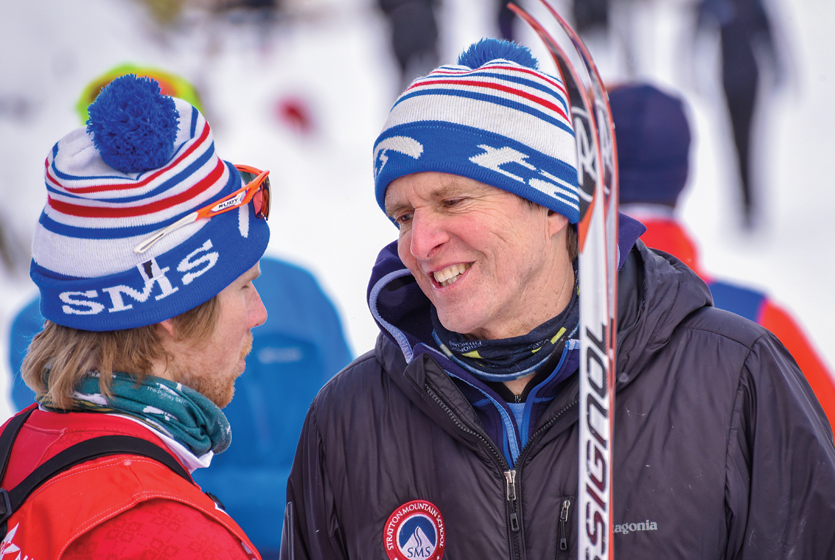Andy Newell, originally from Vermont, is a Stratton Mountain School alum, former member of the U.S. Ski Team and four-time Olympian. He now lives in Montana, where he operates Nordic Team Solutions, a training and consulting business for cross country skiers of all ages. Much of his coaching philosophy is inspired by his high school coach, Sverre Caldwell, who retired from Stratton in the spring of 2019 after being with the academy since 1972. —Danny Kuzio
Funny, I can’t really pinpoint the first time I met Sverre. But I do remember the Stratton Mountain School (SMS) camps being hugely influential to me when I was 12 or 13, and that was probably when I had the first one-on-one time with him. The camps were a cool introduction for kids to see what it was like to train full time for skiing. You’d come there and only train. I remember Sverre saying, “This is what it’s like to train full time for skiing. You’re just going to try it out for five days at a time.” And that was your introduction to it. You know, roller skiing every single day. At that time I was just attending the summer camps, but sure enough I ended up going back to SMS as a 15 year old to start training there with the team as a winter-term student, back in 1998.

Stratton Mountain School’s Sverre Caldwell (right) speaks with SMS T2 coach Patrick O’Brien during the 2019 U.S. National Cross Country Ski Championships in Craftsbury, Vt. [Photo] John Lazenby
Sverre obviously grew up in a skiing family with his father, John Caldwell, being a U.S. Ski Team coach, and Sverre raced at Dartmouth as a cross country skier himself. He was one of the founders who helped form SMS, starting off as the Nordic coach when the school was founded back in 1972.
And then, when Jim Galanes came in as the head Nordic coach, Sverre was actually headmaster for a couple of years. And I think he realized that his strength was in working with kids on the athletic side and less administrative-type stuff. That didn’t last long, and he decided to return to the head coaching position, which he held until retiring this past spring.
He makes training incredibly productive and challenging for kids, while making it a learning experience. He was never one of those coaches to just rule with an iron fist and be like, “This is what we’re doing today.” He was always one to make it a well-rounded training experience, which is why I think he’s fit so well in the ski school where he has daily contact with the athletes. Instead of just telling us what to do every day he wanted to make sure we knew exactly why we were doing this workout and how we were improving our fitness.
That’s what I really loved about Sverre and his coaching style. And above all I think he understood the power of the team and the power of making things fun. How when you get a bunch of driven athletes together, a bunch of kids together, the momentum can just roll. Nowadays they call that team culture but back then it was just Sverre’s style.
You have to have that fun factor in order to be successful. Which is something that you’ve now seen the whole U.S. ski community adopt, all the way up through the U.S. Ski Team. But I think Sverre was an early adopter of that vision, where you can be professional and you can be super focused, but you can also have fun at the same time.
There would be days where we’d be going out skiing as a group in high school and Sverre would just like hand us the wax box and be like, “OK, guys. Figure it out. I’m not telling you what to put on your skis today. You guys need to put the kick wax on and make this work on your own.” He did that kind of stuff, making us into independent athletes, so that by the time you graduated from Stratton Mountain School you could more or less write your own training plan, wax your own skis and be an independent, functioning cross country skier.
What has made him such an icon and so successful is the way he can turn out elite-level skiers, because he keeps training very challenging and, at the same time, very simple. And most of all fun. Sverre really values that culture and that team atmosphere, and I’m really grateful for having experienced that first-hand from him. Sverre embodies so many of the similarities that I try to emulate now as a coach. He was just so fun and level headed when it came to working with juniors. I think that’s huge. And that’s something that I try to carry on the tradition of within my teams and my career.
—
This story was first published in Winter 2020 issue of Cross Country Skier (39.2). Find a copy at crosscountryskier.com/store.